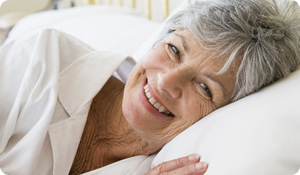
Have you always been a good sleeper, but suddenly can't seem to go more than a few hours without waking? Does your teen, who, as a grade-schooler, used to rise at dawn, now snooze until noon on weekends? How about your elderly father, who seems to be napping every time you call? What's happening with all these shifting sleep patterns?
The most dramatic changes tend to take place in childhood. Newborns go from an erratic sleep/wake cycle to a more consistent one of sleeping through the night and napping in the daytime as they move through toddlerhood. Grade-schoolers tend to sleep well, going to bed early and waking up early. In the teen years, there's a natural shift towards going to bed late and rising late. By early adulthood, many people have figured out whether they're early birds or night owls, but common life transitions can affect even the best sleepers. Here's what you may encounter at various ages:
Sleep in Your 20s, 30s, and 40s
The majority of people become parents during these years. And parenthood is notorious for being a sleep disrupter. Infants need to eat every few hours, and it's a rare for a baby to let his parents slumber as long as they would like. "Women in particular are set to listen and are attuned to hearing the baby," says Shelby Harris, PsyD, director of behavioral sleep medicine and Montefiore Medical Center in New York. Many mothers can attest to jumping awake at the slightest noise while their husbands slumber peacefully. But even after a baby starts sleeping through the night, many mothers have difficulty sleeping. Part of the problem is habit, Dr. Harris says. "If you're using your phone or doing anything else when you're feeding the baby, you're training yourself to stay up."
Sleep in Your 40s and 50s
The kids no longer need you in the night for anything. But just when you think you'll be able to settle into a happy sleep pattern, you become menopausal. It's well known among sleep experts that women going through menopause or perimenopause (the period leading up to menopause, which can last for years) are at tremendous risk for sleep disturbances. Hormones are shifting all over the place, leading to sleep-disrupting hot flashes and early-morning awakenings. Cognitive-behavior therapy may help, Dr. Harris says, as may acupuncture, yoga, and possibly even hormone-replacement therapy (with your doctor's okay).
Sleep in Your 60s and Beyond
Think you can skimp on sleep now? Think again. "The old belief is that the older you get, the less sleep you need," Dr. Harris says. "That's not true." What is true is that the drive to stay awake during the day is lessened, leading to older people napping more. Also, seniors' sleep may be disturbed by bathroom visits, chronic pain, sleep apnea, and a host of other conditions. If you or an older loved one is suffering from insomnia, seek help from a doctor.
Source:
Interview with Shelby Harris, PsyD, director of behavioral sleep medicine at Montefiore Medical Center.





